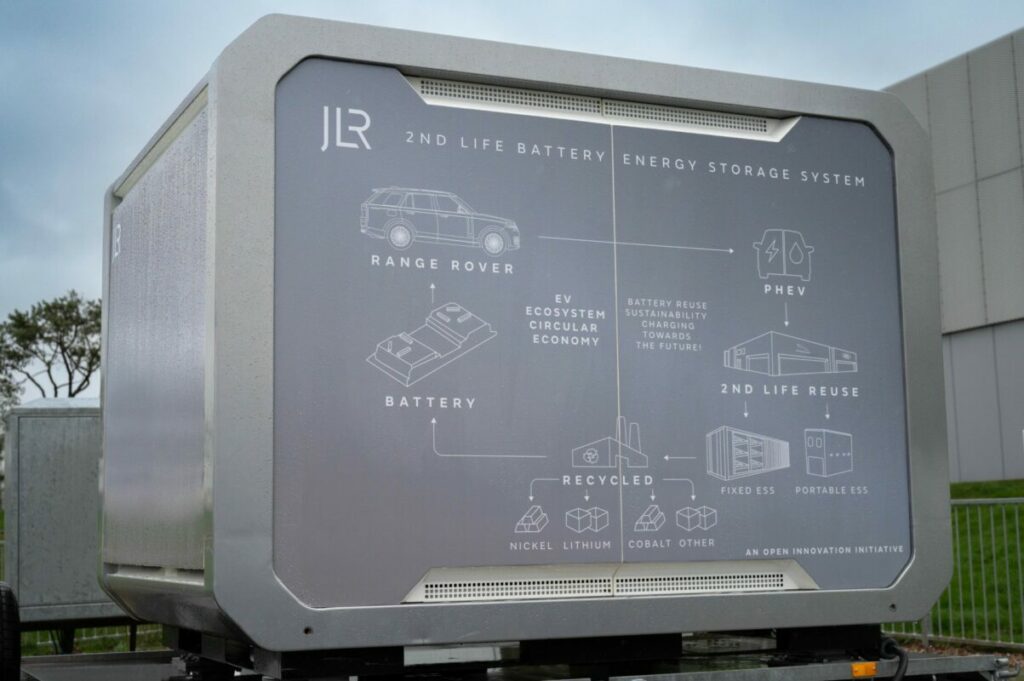
Auto manufacturer Jaguar Land Rover (JLR) has partnered with energy storage start-up Allye Energy on a battery energy storage system (BESS) for powering an electric vehicle (EV) on the go.
One of Allye’s MAX BESS holds seven second-life Range Rover and Range Rover Sport PHEV battery packs, which can be removed from the vehicles and slotted into customised racks without additional processing.
At full capacity, each BESS can store 270kWh of energy, enough to power the average UK household for nearly a month.
The BESS, which is the first to use JLR’s second-life Range Rover batteries, can charge up to nine Range Rover PHEVs at any one time and is designed to be charged by plugging it into any CCS-capable charger using the same input as JLR’s existing PHEV and BEV products.
In turn, JLR’s engineering team is the first to use the new BESS, providing zero-emissions power during testing of the new Range Rover Electric, which will be launched later this year.
JLR’s batteries can be safely deployed in low-energy situations once their health falls below electric vehicle requirements, which typically leaves a 70-80% residual capacity.
Following these second-life use cases, JLR will recycle the batteries so that raw materials can be recovered for reuse in a circular economy.
According to the car manufacturer, battery value chains are predicted to grow 30% annually from 2022 to 2030, reaching a value of more than £320 billion. Second-life battery supply for stationary applications is also predicted to exceed 200GWh per year by 2030, creating a global value of over £24 billion.
François Dossa, executive director of strategy and sustainability at JLR, said: “This battery innovation and partnership with Allye demonstrates the value we can create from repurposing and reusing batteries, such as from our Range Rover vehicles.
“We are creating new value from a used commodity that would otherwise go directly to recycling, keeping them in use for longer, and providing innovative renewable energy storage solutions.”
Jonathan Carrier, CEO of Allye, said: “Our collaboration with JLR exemplifies a shared commitment to sustainable innovation, driving us closer to a future powered by clean energy solutions.
“The deployment of Range Rover PHEV batteries in the MAX underscores Allye’s agnostic approach to integrating batteries from different models, of different states of health (SoH), and cell chemistries to maximize efficiency and sustainability.”
JLR’s renewable growth
JLR has significantly expanded its renewable ventures over the past year, and this partnership is not the company’s first attempt at developing second-life battery charging technology.
In August 2023, JLR partnered with Wykes Engineering to repurpose second-life EV batteries for a battery energy storage system. A single Wykes Engineering BESS comprises 30-second-life I-PACE batteries and can store up to 2.5MWh of energy at full capacity.
JLR stated that it aims to supply enough second-life EV batteries to store a total of 7.5MWh of energy by the end of 2023.
More recently, the car manufacturer announced plans to generate more than a quarter of its UK electricity from renewable energy projects, primarily solar.
Focusing on three UK locations for either manufacturing or non-production, JLR’s new off-grid energy projects aim to produce almost 120MW of renewable energy at their peak.
The three sites include the company’s Halewood plant in Merseyside, the newly named Electric Propulsion Manufacturing Centre (EPMC) in Wolverhampton, and its Gaydon headquarters.
JLR plans to use a mixture of rooftop and ground-mounted panels, as well as solar carports, to power processes and electric car charging, boosting self-generated solar energy capability by 16%.

